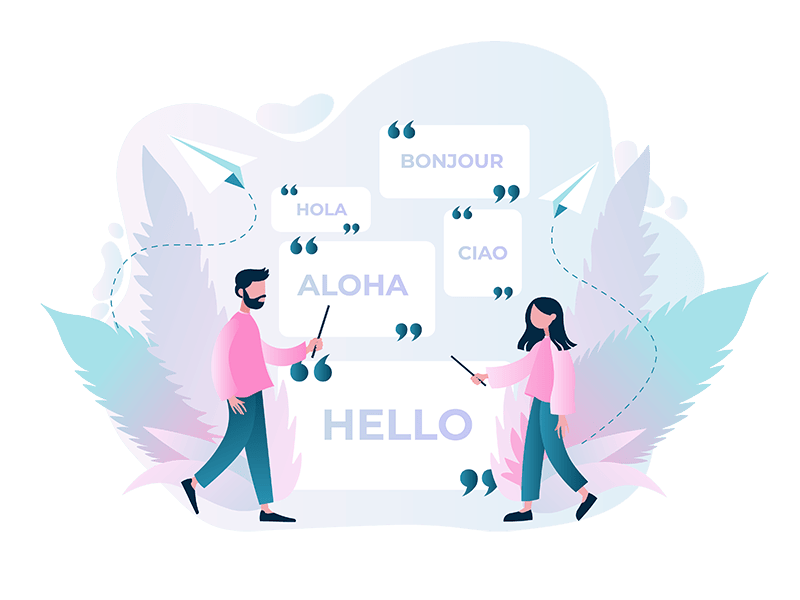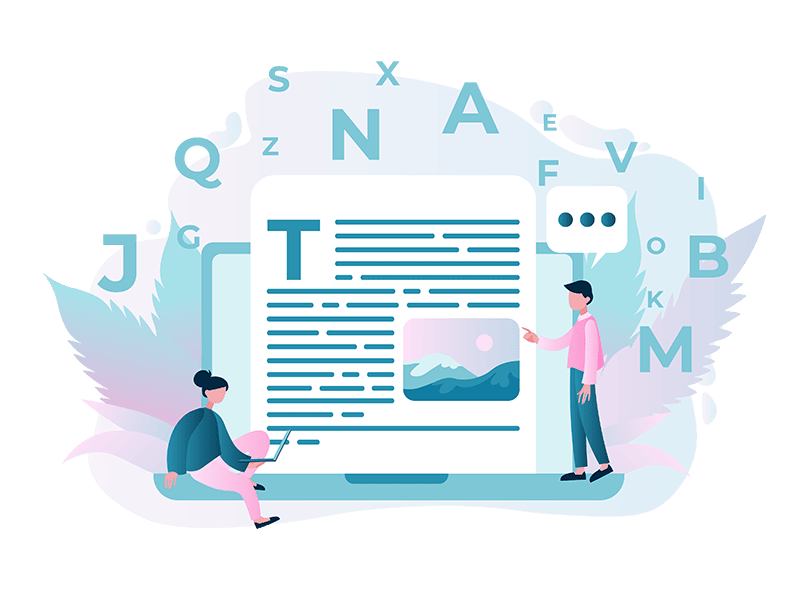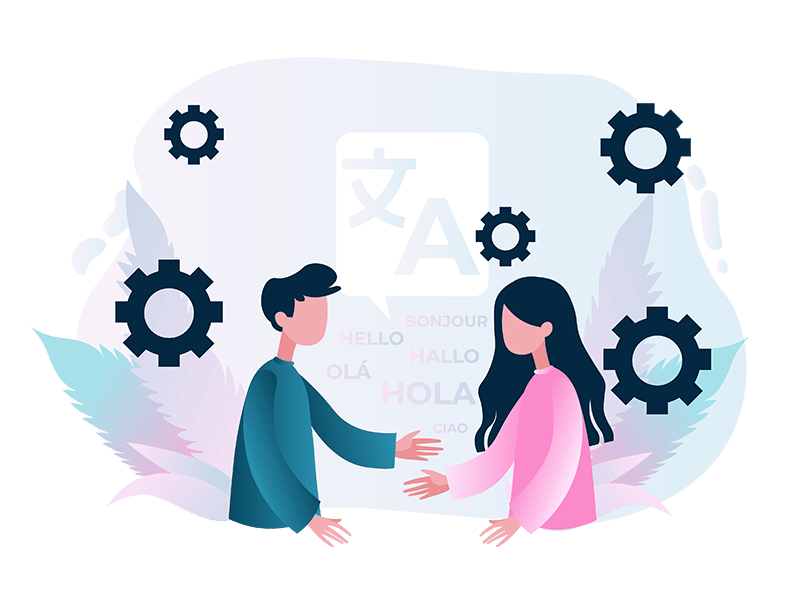Translation Services Agency
ISO Certified 17100
Transparent Pricing
Quote Within 1 Hour
Native Translators
Twice Proofread
150+ Languages





Global Translation Services
Espresso Translations provides affordably-priced global language translation services in +150 languages delivered on time with quality guaranteed.
We can have a quote for our document translation services in 60 minutes or less. That’s why the world’s leading companies choose us as their translation agency.
Request a Quote Now
We will get back to you within 1 hour
Excellent


Global Professional Translation Services
Translation Services
Do you have a text that needs to be translated into different languages? With over 2000 professional linguists covering more than 150 languages, our quality expert translation service provider caters to all of your multi-lingual needs. Try our professional services for high-quality translations!
Localization Services
Are you looking to connect with your target market on more than just a linguistic level? Our localization service involves culturally adapting your global brand or software to suit the foreign markets you are targeting, in more than 150 languages. Try our service!
Transcription Services
We can handle documents in all formats, whether that be .txt or even an entirely handwritten letter. In addition, we also take care of e-mails, text messages, and any other type of correspondence. If you need any documents translated, we offer the best translation services.
Subtitle Services
Whether it’s a question of same-language subtitles or subtitle translations to a number of different foreign languages, our subtitling services put flexibility at the core of our outlook. Our transcription services ensure that the service we deliver meets the requirements of your project.
What’s Included

Linguists with 5+ years’ experience
Documents revised by 2 translators
Transparent per-word pricing
ISO Certified 17100:2015
Competitive quote within 1 hour
Industry experts in language & culture
Our Translation Process

Request a Quote
Complete the online form and upload your material.
Quote in 1 Hr
We will send you a competitive quote within one hour.
Confirm
We wait for you to give us the go-ahead before getting to work.
We Get to Work
A qualified, native linguist will carry out your project.
Review
A second qualified linguist proofreads the completed file.
Quality Assurance
Each file is spell-checked and perfectly formatted.
Delivery
Your file is delivered on time. 14 days free revisions.
Ready To Get Started?
Send us your project request, and we’ll get back to you within 1 hour with a competitive quote for professional translation agency services with price and delivery time.
What Makes Us The Best Choice
Quick Turnaround
With our express solutions, we can have your certified translation documents back to you within a matter of hours in multiple languages.
Fast Response
We get back to you with a quote for the original document within the hour. Your dedicated Project Manager will answer your queries quickly. Ensuring quick communication between you and the company.
ISO-Certified
As an ISO compliant translation business, you can rest assured our translation agency documents are of the highest quality. We offer certified translations and interpreting services.
Native Translators
Our professional linguists only ever translate into their mother tongue. This ensures our documents are fluent and natural-sounding, helping remove cultural barriers.
Our Services
LanguageS
Industries
Our Best Sellers
Certified Translation
For official use, complete with a signed attestation that the translation completed is true & accurate. Try our fast and efficient service!
Document Translation
We work with a diverse range of files and formats thanks to our team of tech experts and translators, from legal translations to documents with technical aspects.
Law Translation
A broad range of online translation services using expert translators ranging from contracts to patents, whatever your required languages.
Business Translations
Our translations documents will help you expand your organization into international markets or international customers. Try our leading translation agency service!

Our Leading Translation Agency
Espresso Translations is a fast-growing, leading ISO translation agency providing a vast array of professional language solutions to companies and individuals worldwide. We offer quality global translation services in all major languages thanks to our network of more than 2000 highly-skilled translators.
Our professional language services include standard, urgent, and certified translations, proofreading, transcription, localization, voice overs, transcreation, subtitling, and desktop publishing of documents. Try our document translation service for expert translators and competitive prices.
What Do Our Clients Say?
The quick response and service offered by Espresso Translations enabled us to meet a tight deadline for our documents. Excellent!
– Barbara
FREENOW
It has been a joy to work with Espresso Translations who provided us with a very friendly and responsive translating service.
– Chistine
THE SALVATION ARMY
Request a Quote Now
We will get back to you within 1 hour
Excellent


About Us
What makes our service unique?
Many companies provide translation services in several languages, so what’s different about our company and translation process? Well, the key to success for our highly-recommended language translation and transcription services is that we only use linguists who are native speakers of your target language. This ensures impeccably accurate documents that are localized to the target audience, with translations taking into account the local dialect. This means that native language speakers will understand your content easily.
Around half of our linguists are specialized in a particular field, such as financial document translation services, meaning that we can offer translations for a wide range of requirements, such as technical translation, official translations such as passport office forms, and even translation for mobile apps or market research documents – all in one language or many!
We pride ourselves on the quality of our work and our high-quality customer care. We go above and beyond for each of our clients, whether a student looking for CV translation services or account managers seeking finance translation, to multinational organizations seeking quality marketing translation services. Each client is allocated a Project Manager who will be their main point of contact from the moment they send their documents to when they received them and after. So they know who to speak to if they have any questions about our language translation services online.
As a company, we are ready and willing to be as flexible as possible with our language services, so if that means arranging a phone call, a video conference, or a face to face meeting with our clients to discuss translation services, our company is more than happy to do so.
We like to think of ourselves as a rather tech-savvy translation partner. Our international clients can choose whether they prefer a human translation interpretation or using the latest translation technology CAT tools such as Trados, MemoQ, Linguee, etc. When it comes to voice overs or transcriptions, we are familiar with many time-coding tools such as Aegisub, Subtitle Edit, Subtitle Workshop, and more. Our document translation services use all the best top-of-the-line technology to deliver the best product possible to our clients.
Our company also has dedicated tech experts for those jobs that may involve multilingual typesetting, for example, modifying text within images using Photoshop, saving files in unusual formats, or API integration.
This is particularly useful in German translation or Italian whereby the word count increases by approximately 20% when translated.
We are trusted by some of the biggest companies in the world clients. No task is too big or too small for us. Our global language translation agency is a stickler for deadlines; our motto is: on time, every time. And we do absolutely everything in our power to keep to our word.
Unlike other companies, we endeavor to help you reduce costs and so our language translations come at very affordable prices. Don’t believe us? Request a free quote by contacting us. One of our project managers will be in touch with an extremely competitive pricing quote within the hour.
How was the Espresso Translations agency founded?
Espresso Translations language service was founded back in 2011 by Danilo and Niki, two linguists who worked together to provide services. In its early days, Espresso’s office focused solely on a few languages, however, due to increasing numbers of requests for accredited language services for complex multi-language projects, Danilo and Niki began building a network of experts covering a broad range of European languages. Over time, both the team and demand grew, so in 2012 they decided to form a language agency specializing in providing translation services.
The business continues to grow rapidly, and today the agency has a 2000-strong translator network covering more than 150 language pairs. Although their primary focus is now the management of the company, still today Danilo and Niki work in tandem to complete translations and interpreting services.
How did we grow?
“When we first started out our language business, it didn’t even cross my mind that we would grow to become an international language agency.
I think the fact that we have worked, and continue to work, as translators ourselves gives us a competitive edge compared to other companies. We understand not only our clients but also the linguists that we work with. We can look at a document and from our own experience, instantly understand more or less how much time and level of experience is required.
We endeavor to deliver 100% accurate texts in a timely manner, every time. Client satisfaction is at the heart of our agency; if they’re satisfied then we are too! We pride ourselves on the fact that we can cater to anyone’s needs. A lot of our competitors focus solely on satisfying larger, international corporate clients, however, we recognize that without our smaller customers, we wouldn’t be where we are today. We maintain affordable prices so that we can continue to cater to both ends of the client spectrum.” —Niki Leiper, Director
Our translation agency: Professional translators
Our professional translators are highly-qualified with at least 5 years’ experience and are chosen from amongst the best available. All of our language experts go through a rigorous selection process to ensure that we secure only the top linguists for your business. Our language experts will only ever translate into their native language, to ensure 100% accuracy, readability, and flow in your target language. This means that your French translation will be completed by a native-speaking expert.
We believe human translators to be far superior to machine translation. We divide our linguists into ‘generalists’ and ‘specialists’ depending on their skills-sets. Each translation order is allocated based on the industry or sector and the knowledge required. For example, a medical document will be handled by a medical translator.
Generalist linguists translate an original document that doesn’t require industry-specific vocabulary. Specialists specialize in one particular area and are fluent in industry-specific vocabulary – for example, digital content, food & beverage, medical, and technical translation. We can also offer certified translations with a British notary public.
Our linguists are accurate professionals, experts in their native languages. They understand that translating isn’t merely changing words from one language to another, but taking into consideration local cultures, social, political, economic, and religious factors along with different dialects and local slang to produce the best global content. A Spanish translation, or Serbo Croat for example, will always be completed by a native speaker, even if the client requests services in Washington.
Professional service with quality assurance
Our devoted and friendly team works collaboratively with you to meet your demands and requirements. Our linguists uphold our high ISO 17100:2015 quality standards and sustain our policies throughout the entire process.
As part of our accurate translation services quality assurance protocol, every linguist will proofread and spell check their work before delivery. A second proofreader will then review the document to ensure that it has been done to the highest standard. This accuracy guarantee is essential for certain types of sophisticated translation online such as web content, technical documents, certified translations (and work of a British Notary Public), or software localization.
We as a language interpretation agency take pride in the high quality of our work and thrive on positive feedback from our international clients. If you have any queries or require any clarification, we allow unlimited revisions within 14 days of the date of delivery – just contact your Project Manager, and they will be happy to assist you.
How do our language translation services work?
Let us give you an idea of what the translation solution process for your translation needs looks like:
- You upload your files and send them to us via our online form or by e-mail;
- A designated Project Manager will review the doc(s) and send you a free quote based on the length of the text(s), the complexity of the language pair, and the delivery date. We are very proud of our fast turnaround times. We endeavour to quote all global clients within the hour.
- For the first job with a client, it is our policy that we receive payment in full before delivery;
- Once we have payment confirmation, our most suitable linguist will begin working on the doc. We have a wide range of experts, whatever your needs.
- Once the document is complete, it is proofread by the translator. This is to ensure the translation services we provide are completely free of errors.
- The file is then reviewed by a second linguist;
- The file is subject to quality assurance checks. Our document translation is a full service for all your translation needs.
- We send the file back to you via e-mail and/or post, depending on your requirements, within the agreed delivery date. Your document, completed with a certified translation, is delivered to you on the due date decided.
- You can ask your Project Manager for unlimited revisions within 14 days of the delivery date. Our translation agency offers 14 days free revisions on all our document transition services.
Meanwhile, behind the scenes, our global translation agency continues to recruit new experts so that we can expand our offering of certified translation services even further, broadening language pairs and specialties on a daily basis.
Language services – ISO 17100:2015 certification
Espresso Translations language service agency, one of the best translation agencies, is ISO 17100:2015 certified for industry experts quality standards. ISO 17100:2015 certification means that you have a guarantee that our quality translation services follow a recognized standard while meeting your translation requirements. It means that the translation phase and the proofreading/editing phase of your translation project will be handled by two different translators.
It also ensures that when you choose our translation agency service, you’re going to be working with people who are appropriately qualified to handle your project. You will receive a final product with the lowest margin of error possible and your confidentiality will always be assured.
Our promise
Customer satisfaction is at the very center of everything our translation company does. Our promise to all of our global clients is that we will deliver accurate, reliable, and affordable translator services, on time, every time, with an added personal touch. Our rates are affordable, and there will never be any extra hidden costs.
Each client will be assigned a dedicated PM who will identify the translator that is best suited to the task’s requirements. We have made our process as simple as possible, however, whenever you have any queries about our accurate translation services, your Project Manager will be happy to answer your questions straight away.
Translate this into meaning we care a lot about making our customers happy.
Confidentiality
Our translation agency understands that data security is paramount, particularly when it comes to translating sensitive items like medical or legal documents. Our translation services, offered by one of the best translation agencies, follow strict data security policies. We safeguard all customer data in line with the GDPR. Rest assured that each member of our trusted team agrees to abide by confidentiality terms at the beginning of every language translation project. We will sign NDAs with any of our global clients, should they so wish.
Professional online translation services
- As translation services, we are a professional global translation partner whenever you need us! Whether early morning or late night – our professional team is here to help.
- Whether you need a common language like French or a less common language like Serbo Croat, we offer an efficient and professional service. We are widely regarded as one of the most respected translation companies, capable of delivering high quality professional online translation services.
- International language translation company: certified translation services on a global scale. Our solutions list includes urgent, sworn, document, and creative translation interpretation.
- One of the most professional translation services online, you are in safe hands. As a highly-reviewed provider of certified translation services (LSP), we guarantee 100% quality and accuracy and this is reflected in our client feedback. Whatever your location, whether you’re working from an office in a capital city, or a rural home office, we can help.
Frequently Asked Questions
How much do translation services cost?
We offer clear per-word pricing so you know exactly what to expect. The exact price depends on the language pair and type of document, but pricing in the translation industry can range from roughly US$0.08 to $0.28 per word
What are translations services?
We can translate any written or spoken content or documents into a range of different languages. This can include technical documentation, customer support websites, static website copy marketing, official documents, video lectures, and more. We take the source material and reform it in whatever target languages you need.
What are the benefits of translation services?
– Increase your customer base and improve sales, reaching a global audience.
– Reach out to international partner companies or investors
– Work with experts from around the world and increase the services you offer.
Why do we need translation services?
Translation helps achieve effective communication between different cultures in a way that native speakers can understand. Whether your business is a massive manufacturing operation or a start-up based in a home office, in this day and age it is vital to reach out to people across the world, and translation makes that effortless and effective.